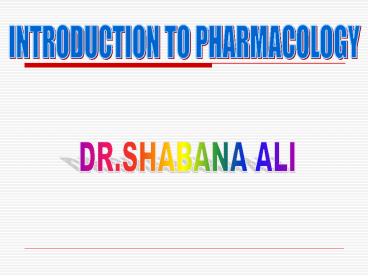INTRODUCTION TO PHARMACOLOGY - PowerPoint PPT Presentation
1 / 15
Title:
INTRODUCTION TO PHARMACOLOGY
Description:
PHARMACOLOGY Science of drugs Greek words= pharmakon (drug) and logos (study) Deals with interaction of exogenously administered chemical molecules with living system ... – PowerPoint PPT presentation
Number of Views:1369
Avg rating:3.0/5.0
Title: INTRODUCTION TO PHARMACOLOGY
1
INTRODUCTION TO PHARMACOLOGY
DR.SHABANA ALI
2
PHARMACOLOGY
- Science of drugs
- Greek words pharmakon (drug) and logos (study)
- Deals with interaction of exogenously
administered chemical molecules with living
system
3
- All aspects of the study of drugs including drug
development, drug-biological system interaction,
therapeutics and toxicology
4
HISTORICAL BACKGROUND
- Recent branch of medical science 100 y old
- Worlds oldest pharmacological or therapeutic
writing come from China and India
5
BRANCHES/DIVISIONS OF PHARMACOLOGY
- Pharmcodynamics (Greekdynamis, power)
- Deals with biological effects (pharmacologic and
toxic) and mechanism of action of the drug
6
2) Pharmacokinetics (Greekkinesis, movement)
- Refers to movement of the drug in, through and
out of the body to achieve drug action - Four major processes absorption, distribution,
biotransformation and excretion
7
3) Pharmcotherapeutics
- Application of pharmacological information
together with knowledge of the disease for its
prevention or cure i.e. use of drugs in treatment
of disease - 4) Clinical pharmacology
- Scientific study of drugs in man
- Pharmacodynamics and pharmacokinetics
investigation in healthy volunteers and in
patients
8
5) Chemotherapy
- Treatment of systemic infection/malignancy with
specific drugs that have toxicity for infecting
organism with no/minimal effects on host cells - 6) Pharmacy
- Preparation, compounding and dispensing the drugs
- Collection, identification, purification,
isolation, synthesis, standardization and quality
control of medicinal substances - Large scale manufacture of drugs is Pharmaceutics
9
7) Toxicology
- Study of poisonous effects of drugs and other
chemicals (household environmental pollutants,
industrial, agricultural, homicidal) with
emphasis on detection, prevention and treatment
of poisoning - Study of adverse effects of drugs
10
8) Pharmaceutical chemistry
- Deals with chemical structure and chemical
reactions of active principles of drugs - 9) Pharmacognosy (Materia Medica)
- Deals with source, identification, physical and
chemical characteristic of drugs obtained from
plants - 10) Posology
- Deals with doses
11
DRUG
- Derived from French word, drogue (dry herb)
- Chemical substance used in minute quantities for
the diagnosis, prevention or treatment of
diseases - All biologically active chemicals including
poisons and addictive substances are drugs
12
MEDICINE
- Chemical prep. usually but not necessarily
contains one or more drugs administered with the
intention of therapy - Active drugother sub. For its convenient use
- Drugs are given as such rather than released by
physiological mechanism
13
DRUG NOMENCLATURE
- Drug has 3 names
- 1) Chemical Name
- According to molecular structure of drug
- Long, complicated, inconvenient and not used
clinically - e.g. acetylsalicylic acid of aspirin
14
2) GENERIC NAME (NON PROPRIETARY)
- Official name or approved name
- Simple, accepted world wide and used in text
books, pharmacopoeias, medical journals and other
reference books - E.g. ampicillin, aspirin
15
- 3) Proprietary Name
- Brand name chosen by pharmaceutical firm
- Same drug may have different names
- e.g. paracetamol (Acenol, Aminol, Atamol etc)

